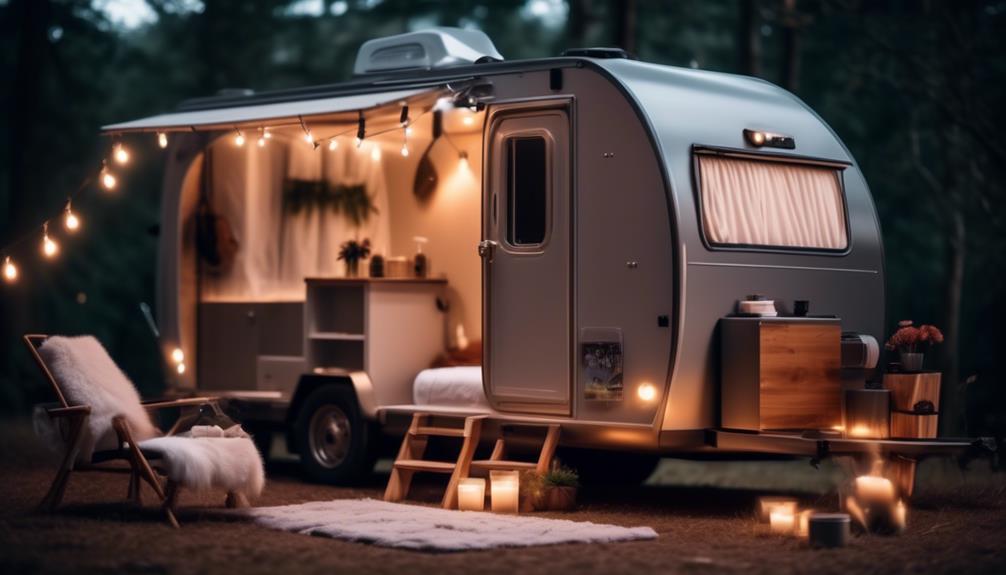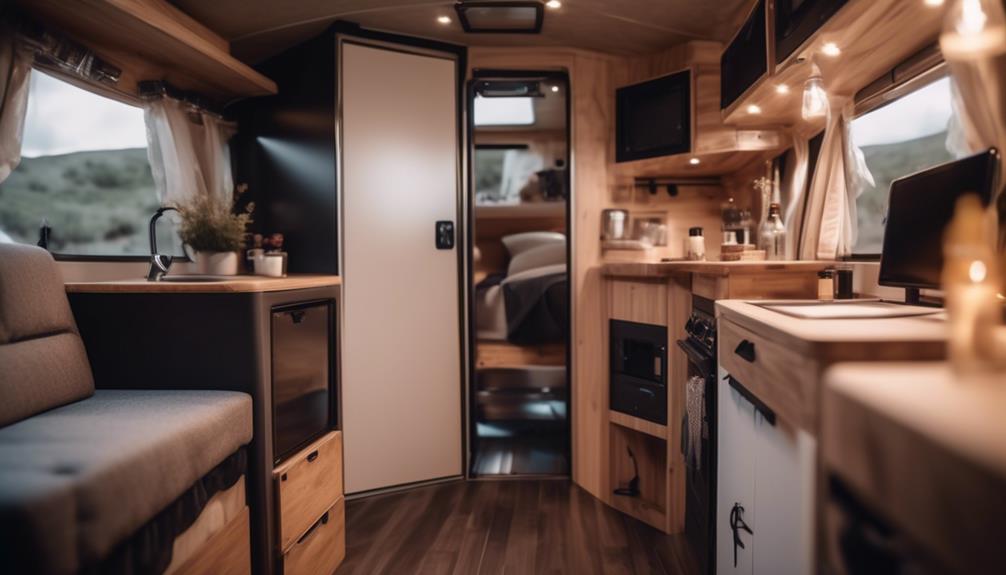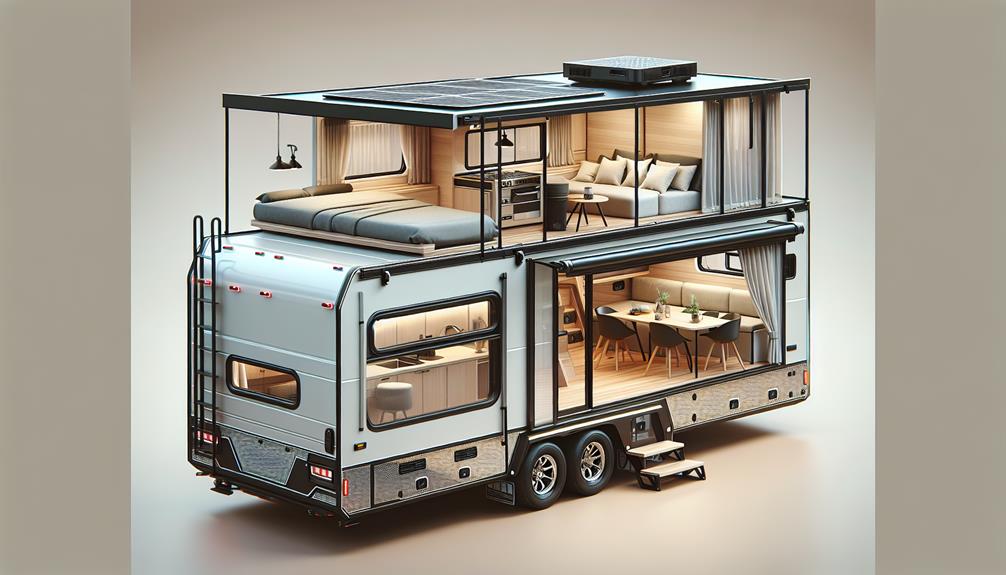Are you tired of the same old vacation routine? Ready to break free from the constraints of traditional travel and experience the thrill of life on the road?
Well, I have just the solution for you. Imagine converting a simple cargo trailer into your very own ultimate camper, customized to meet your every need.
From the initial planning stages to the final touches, I will guide you through the process of transforming your trailer into a comfortable and functional home on wheels.
So, if you're ready to embark on a new adventure, let's uncover the secrets of turning your cargo trailer into the ultimate camper.
Key Takeaways
- V-Nose and flat nose trailers are popular options for conversion into campers, with V-Nose trailers providing extra front space and better aerodynamics.
- The size of the cargo trailer for conversion depends on the number of occupants and the storage needs, ranging from 5×8 trailers for solo campers to 7×14 trailers for larger families.
- Planning ahead is crucial in the building process of a camper, considering factors like layout, storage, and functionality within the limitations of the trailer.
- When designing the bathroom, options include composting bucket toilets, portable toilets, shower stall kits, or DIY handmade showers. In the bedroom, options include elevator beds, raised beds, Murphy beds, or futon beds, based on personal preferences and space utilization needs.
Trailer Types and Sizes for Conversion
When it comes to converting a cargo trailer into the ultimate camper, choosing the right type and size of trailer is crucial. Customization options abound, so it's important to consider the pros and cons of each.
One popular option is the V-Nose trailer, which provides extra front space for storage or a bathroom. It's more aerodynamic and fuel-efficient, but the V shape can complicate the layout.
Another option is the flat nose trailer, which is affordable and offers more interior space by the hitch. Adding a wind deflector can improve aerodynamics.
Toy haulers are another choice, with dedicated garage space for large items. Bumper pull toy haulers have smaller garages, while fifth wheel toy haulers separate the garage from the living area.
When it comes to size, 5×8 trailers are suitable for solo campers, while 6×10 trailers are ideal for couples. The 6×12 trailer offers more room for storing supplies, while the 7×12 and 7×14 trailers are suitable for small and larger families, respectively.
Consider your specific needs and preferences when selecting the type and size of trailer for your ultimate camper conversion.
Designing and Building the Camper
To design and build the ultimate camper, careful planning and consideration of your specific needs and preferences are essential. Here are four key factors to focus on during the design and building process:
- Importance of proper insulation, heating, and cooling in a camper:
Ensuring your camper is well-insulated will help maintain a comfortable temperature regardless of the weather. Consider using materials like foam insulation and thermal windows to minimize heat loss and gain. Additionally, investing in a reliable heating and cooling system will provide year-round comfort.
- Maximizing natural light and ventilation in the camper design:
Incorporating large windows and skylights in your camper won't only enhance the aesthetic appeal but also allow for ample natural light and fresh air circulation. Consider installing roof vents or fans to improve ventilation and prevent condensation.
- Layout and functionality:
Plan the layout of your camper to optimize space and functionality. Consider the placement of essential amenities like the kitchen, bathroom, and sleeping area. Maximize storage options by incorporating shelves, cabinets, and under-bed storage.
- Personalization:
Make the camper your own by adding personal touches that reflect your style and preferences. Consider customizing the interior with unique fabrics, colors, and decor. Don't forget to incorporate innovative and space-saving solutions for a truly innovative camper design.
Bathroom and Bedroom Options

Properly designing and building the ultimate camper involves considering various factors, and now we'll explore the options available for the bathroom and bedroom in your camper conversion.
When it comes to the bedroom, one innovative option is the elevator bed. This type of bed maximizes floor space by raising and lowering, allowing for easy access to storage underneath. It's a great solution for those looking to optimize space in their camper.
However, if you have a V nose trailer layout, you may encounter challenges in designing the bedroom due to the complicated V shape. It's important to carefully plan and utilize the available space to create a functional and comfortable sleeping area.
Despite the challenges, with some creativity and innovation, you can still design a cozy and efficient bedroom in your cargo camper.
Kitchen Design and Appliances
Designing the perfect kitchen for your cargo camper requires careful consideration of space-saving solutions, personalized customization, and efficient appliances.
Here are four innovative ideas to help you create a functional and compact kitchen:
- Compact Appliances: Opt for space-saving appliances that are specifically designed for small spaces. Look for compact stovetops, convection toaster ovens, and portable electric fridges that are compatible with solar power. These appliances won't only save valuable counter space but also reduce power and space usage.
- Foldable Tables: Utilize foldable tables or countertops that can be easily tucked away when not in use. This will provide you with extra workspace during meal preparation and can be conveniently stored to create more room in your camper.
- Vertical Storage: Maximize space by utilizing vertical storage options such as hanging racks, shelves, and cabinets. This will allow you to store pots, pans, and dishes in an organized and efficient manner.
- Personalized Customization: Customizing your kitchen to fit your cooking habits and needs is essential. Consider your preferred cooking methods and plan for proper ventilation and cooking safety measures. Personalize your kitchen with accessories that suit your style and make your cooking experience enjoyable.
Plumbing, Power, and Other Considerations

When it comes to transforming a cargo trailer into the ultimate camper, there are several important considerations to keep in mind, including plumbing, power, and other essential factors for a comfortable and functional camping experience.
Plumbing in a cargo trailer camper can be achieved through the use of an RV water inlet for convenient campsite hookups. However, for off-grid camping, a water storage tank is ideal. It's also important to consider a heating source and an inline water filter for clean and warm water.
Speaking of power, a temporary 50-amp plug can provide flexibility with the power source. Additionally, solar panels can be mounted on the roof for on-the-go power, which is a preferred electric source for some campers.
When designing your cargo trailer camper, don't forget to prioritize proper ventilation to ensure a safe and comfortable environment.
Cost and FAQs
For those considering converting a cargo trailer into a camper, understanding the cost and addressing common FAQs is crucial. Here are four key points to keep in mind:
- Cost of Materials: The cost of materials for the conversion can vary depending on the quality and features you desire. Factors such as insulation, windows, HVAC systems, and appliances will contribute to the overall cost.
- Cost of Appliances: When selecting appliances for your camper, consider the size, energy efficiency, and functionality. Compact and energy-efficient appliances may cost more upfront but can save you money in the long run.
- Cost of Labor: If you're not comfortable with DIY projects, hiring a professional to convert your cargo trailer can be an option. Keep in mind that labor costs can significantly impact your budget, so it's essential to get quotes and compare options.
- Common Challenges and Solutions: Converting a cargo trailer into a camper may come with challenges like limited space, electrical wiring, and plumbing. Researching and planning ahead can help you find innovative solutions and workarounds to overcome these challenges.
Understanding the cost and addressing common challenges will help you make informed decisions and create the ultimate camper from your cargo trailer.
Frequently Asked Questions
Can I Convert Any Type of Trailer Into a Camper?
Yes, you can convert any type of trailer into a camper. With cargo trailer modifications and a DIY camper conversion, you can transform your trailer into the ultimate camping experience. Get creative and make it your own!
How Can I Ensure Proper Ventilation in My Cargo Trailer Camper?
To ensure proper ventilation in my cargo trailer camper, I would maximize space by incorporating windows or vents that can be opened. Additionally, I would consider adding insulation to regulate temperature and airflow.
What Are the Weight Limitations for Towing a Cargo Trailer Camper?
The weight limitations for towing a cargo trailer camper depend on the size and model of your vehicle. It's important to know your vehicle's towing capacity to ensure safe and efficient towing.
Are There Any Restrictions on Where I Can Park or Camp With a Cargo Trailer Camper?
There may be parking restrictions and camping regulations for cargo trailer campers. It's important to research and abide by local laws and regulations to ensure you can park and camp legally and avoid any fines or penalties.
What Are the Legal Requirements for Converting a Cargo Trailer Into a Camper?
Converting a cargo trailer into a camper requires attention to legal requirements and safety considerations. It is important to check with your local DMV for any licensing or registration requirements and to ensure that your cargo trailer camper is properly insured. Safety considerations include proper ventilation, carbon monoxide detectors if using propane, and temperature monitoring devices when traveling with pets.
Conclusion
In conclusion, transforming your cargo trailer into the ultimate camper is an exciting and rewarding project. By customizing your camper to fit your needs and lifestyle, you can create a home on wheels that provides comfort, convenience, and endless adventures.
Did you know that over 60% of people who convert their trailers into campers report a significant increase in their overall travel satisfaction? This statistic highlights the positive impact that a personalized camper can have on your travel experiences.
So, what're you waiting for? Start your journey today and experience the joy of hitting the open road in your own personalized camper. Embark on new adventures, explore scenic destinations, and enjoy the freedom of having your own portable home. Don't miss out on the opportunity to enhance your travel experiences and create lasting memories. Begin the transformation of your cargo trailer into a camper and reap the benefits of a customized travel accommodation.

